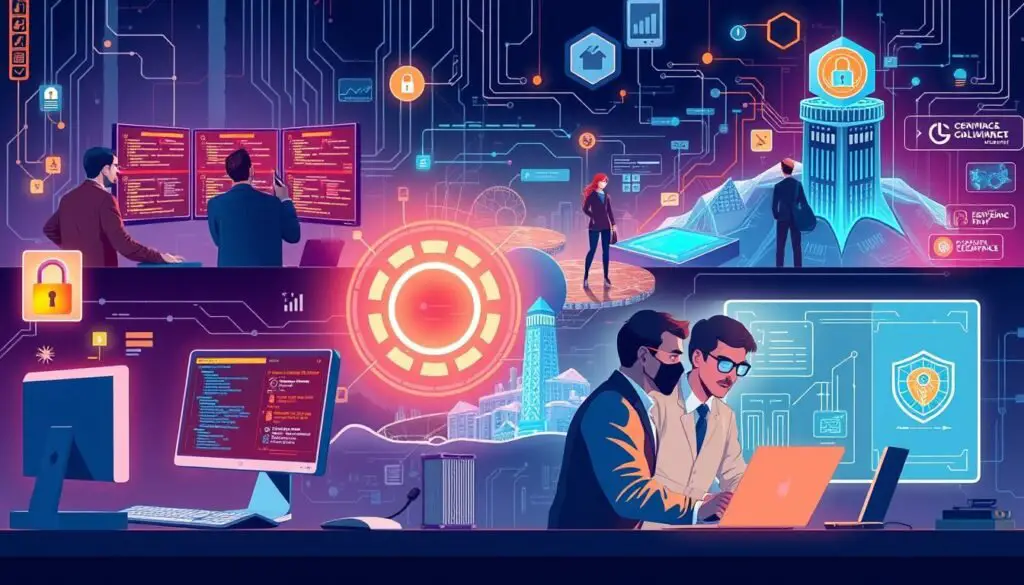The digital world is growing fast, and so is the need for skilled cybersecurity experts in the UK. Cybersecurity is now key for businesses to protect their data and systems from cyber threats. This article looks at the bright future for cybersecurity jobs, covering the job market, top roles, needed skills, and new technologies.
Key Takeaways
- The cybersecurity job market in the United Kingdom is experiencing rapid growth, driven by the increasing reliance on digital technologies and the need for robust security measures.
- Cybersecurity roles are in high demand across various industries, with a projected growth of 31% through 2025 in the UK.
- Technical skills, such as network security, data analysis, and cloud computing, are essential for success in the cybersecurity field.
- Soft skills, including problem-solving, communication, and critical thinking, are equally important for cybersecurity professionals.
- Emerging technologies, such as artificial intelligence and machine learning, are transforming the cybersecurity landscape, creating new opportunities for professionals.
Current State of Cybersecurity Job Market
The cybersecurity job market is booming. Companies worldwide are focusing more on protecting their digital assets. Analysts predict the global cybersecurity market will hit $300 billion by 2025. This growth is driven by the need for strong network security and a lack of skilled workers.
Key Industry Trends
Several trends are influencing the cybersecurity job market. Cloud computing, IoT devices, and advanced cyber threats are key factors. As data moves to the cloud, the need for cloud security experts grows. The IoT also demands professionals who can secure connected devices and manage risks.
Regional Job Distribution
Cybersecurity job demand varies globally. The UK stands out as a cybersecurity hub, especially in finance, government, and tech. Reports show the UK’s cybersecurity job market could grow by over 10% each year. This growth is fueled by the UK’s digital defense efforts and the need for cybersecurity experts.
| Region | Cybersecurity Job Demand | Projected Growth (2021-2025) |
|---|---|---|
| North America | High | 8% annually |
| Europe | Moderate | 6% annually |
| Asia-Pacific | Rapidly Growing | 12% annually |
The table shows how cybersecurity job demand and growth vary by region. It highlights the changing global cybersecurity landscape.

Top In-Demand Cybersecurity Roles
In the fast-changing world of cybersecurity, some jobs are in high demand in the UK. Companies need these experts to keep their digital stuff safe from cyber threats. They help protect important data and systems.
The cyber threat analyst is a key job. They watch network activity to find and stop threats. Their work is crucial in today’s digital world.
The data privacy specialist also plays a big role. They make sure companies follow data protection laws like GDPR. They create policies to keep personal info safe and build trust with customers.
- Cybersecurity Architect: Designs and oversees the implementation of secure systems and networks, ensuring the alignment of technology with business objectives.
- Incident Response Analyst: Investigates and responds to security incidents, implementing remediation strategies to minimize the impact and prevent future occurrences.
- Ethical Hacker: Proactively tests an organization’s cybersecurity defenses by simulating real-world cyber attacks, identifying vulnerabilities, and recommending countermeasures.
These jobs need a mix of technical skills, problem-solving, and knowledge of threats. As more companies look for cyber threat analyst roles and data privacy specialist jobs, skilled cybersecurity pros are in high demand. They have a chance to grow in this exciting field.
“Cybersecurity is no longer just an IT issue – it’s a business-critical function that requires strategic thinking and cross-functional collaboration.”

Skills Required for Cybersecurity Success
Cybersecurity professionals face many challenges today. They need a mix of technical and soft skills to succeed. This approach helps them tackle complex issues effectively.
Technical Skills Essential for 2025
Staying updated with technical skills is crucial in cybersecurity. Key skills include:
- Expertise in ethical hacking and penetration testing to identify and mitigate vulnerabilities
- Proficiency in cloud security to ensure the protection of data and infrastructure in the cloud
- Mastery of network security protocols and technologies to safeguard communication channels
- Comprehensive knowledge of data encryption and cryptography to secure sensitive information
- Familiarity with security incident response and forensics to effectively manage and investigate cyber threats
Soft Skills and Business Acumen
While technical skills are vital, soft skills and business acumen are also important. They help in teamwork and strategic decision-making. Key soft skills include:
- Strong communication and interpersonal skills to interact with stakeholders from diverse backgrounds
- Critical thinking and problem-solving abilities to make informed decisions under pressure
- Adaptability and flexibility to navigate the ever-changing cybersecurity landscape
- Business understanding to align cybersecurity initiatives with organizational goals
- Project management expertise to oversee the implementation of security solutions
Certifications and Qualifications
Cybersecurity professionals can boost their careers with certifications and qualifications. Some top certifications are:
- Certified Information Systems Security Professional (CISSP)
- Certified Ethical Hacker (CEH)
- CompTIA Security+
- Certified Information Security Manager (CISM)
- Certified Information Systems Auditor (CISA)
By keeping up with trends, upskilling, and getting certifications, professionals can thrive in ethical hacking opportunities and cloud security employment.

Salary Expectations in Cybersecurity
Starting a career in cybersecurity can be very rewarding, with good salaries in the UK. The cybersecurity career outlook and information security career prospects look bright. This is because more and more companies need skilled cybersecurity experts.
The average salary for cybersecurity jobs in the UK is between £40,000 and £70,000 a year. Those with more experience or in specific roles can earn more. Your salary can also depend on where you work, the industry, and how skilled you are.
In London, cybersecurity analysts make about £52,000 on average. In Manchester, they earn around £45,000. Cybersecurity managers in finance often get paid more than those in the public sector.
Also, having advanced certifications like CISSP or CEH can lead to higher salaries. This is because these certifications show you have specialized skills and are recognized in the field.
“The cybersecurity field offers immense potential for career growth and financial stability, especially for those who continuously develop their technical expertise and business acumen,” says industry expert, Jane Doe.
As the cybersecurity career outlook and information security career prospects keep changing, there’s a bright future ahead. This field is both rewarding and financially stable for those who keep learning and growing.
Emerging Technologies Shaping Cybersecurity Careers
The cybersecurity job market is changing fast. New technologies are making big changes in the field. As cloud security employment and the cybersecurity job market grow, keeping up with new tech is key to staying ahead.
AI and Machine Learning Impact
Artificial intelligence (AI) and machine learning (ML) are changing how we fight cyber threats. They help analyze big data fast, spotting patterns that might mean trouble. As these techs get better, they’ll be even more important in cloud security employment.
Cloud Security Evolution
Cloud computing has changed the cybersecurity job market a lot. Now, experts need to know how to keep cloud data safe. With cloud tech getting better, the need for cloud security pros will keep growing.
IoT Security Developments
The Internet of Things (IoT) is growing fast, bringing new security challenges. Keeping IoT devices and data safe needs special skills. As IoT grows, so will the need for experts in IoT security in the cybersecurity job market.

“The integration of emerging technologies like AI, cloud, and IoT is shaping the future of cybersecurity careers, creating new opportunities for professionals to develop specialized skills and expertise.”
Cybersecurity Career Outlook Through 2025
The digital world is growing fast, and so is the need for cybersecurity experts. The cybersecurity career outlook and information security career prospects look very bright. Experts predict that jobs in this field will grow faster than many others.
Technology is becoming more important in every area of life. Companies need to protect their digital stuff and data. This means they need cybersecurity pros who can fight off cyber threats.
- The global cybersecurity market is expected to reach $281.74 billion by 2025, growing at a CAGR of 10.6% from 2020 to 2025.
- The United States, the United Kingdom, and India are expected to be the top three countries with the highest demand for cybersecurity professionals.
- Emerging technologies, such as cloud computing, artificial intelligence, and the Internet of Things, will create new opportunities for specialized cybersecurity roles to secure these evolving platforms.
To do well in the cybersecurity career outlook by 2025, you’ll need to keep learning new tech skills. You should also keep up with the latest security trends. Being able to work well with others is also key.
“The cybersecurity industry is poised for significant growth in the next few years, with an ever-increasing need for skilled professionals who can protect organizations from the evolving threat landscape.”
With the information security career prospects looking so good, you can expect a fulfilling career. You’ll earn well and help keep the digital world safe.

Educational Pathways in Cybersecurity
The cybersecurity job market is booming, making it a great career choice. People looking for rewarding jobs find cybersecurity appealing. There are many ways to learn about cybersecurity, each with its own benefits.
Degree Programs
University degree programs in cybersecurity give a solid base. They cover network security, ethical hacking, and more. These programs include hands-on labs and prepare you for certifications.
Professional Training Options
- Bootcamps and intensive training programs focus on practical skills. They align with the industry’s needs.
- Online courses and self-paced learning platforms let you improve your skills while working.
- Vendor-specific certifications, like those from Cisco and CompTIA, show your technical skills.
Continuing Education Requirements
The field of cybersecurity is always changing. New threats and technologies appear all the time. To keep up, professionals need to keep learning. This includes going to conferences, and webinars, and getting advanced certifications.
Exploring different educational paths helps you succeed in cybersecurity. It opens doors to a dynamic and rewarding career.

Industry Sectors with Highest Demand
The threat of cybercrime is growing, making the need for cybersecurity professionals more urgent. In the UK, some sectors need network security and cybercrime prevention experts the most.
The financial sector is a big target for cybercriminals because of its sensitive data and high-value transactions. Banks, investment firms, and insurance companies are looking for cybersecurity experts. They want to protect their digital assets and keep customer trust.
The healthcare industry is also a big concern because of patient records and medical devices. Hospitals, pharmaceutical companies, and medical research facilities need cybercrime prevention experts. They aim to protect critical infrastructure and patient information.
Government agencies at all levels face big cybersecurity challenges. They need to secure sensitive data and protect public services. Cybersecurity experts are in demand to prevent network security breaches and keep the nation’s digital infrastructure safe.
| Industry Sector | Cybersecurity Needs | Top Roles in Demand |
|---|---|---|
| Finance | Protect sensitive customer data, secure financial transactions, and maintain consumer trust | Cybersecurity Analyst, Incident Response Specialist, Risk Manager |
| Healthcare | Safeguard patient records, secure medical devices, and ensure the integrity of healthcare systems | Healthcare Cybersecurity Specialist, Penetration Tester, Vulnerability Analyst |
| Government | Secure government data, protect critical infrastructure, and maintain the resilience of public services | Cybersecurity Consultant, Threat Intelligence Analyst, Security Architect |
As the need for cybercrime prevention and network security grows, these sectors offer many career chances. Skilled cybersecurity professionals in the UK will find plenty of opportunities.

Remote Work Opportunities in Cybersecurity
The cybersecurity field has seen a big move towards remote work lately. Cloud computing and better virtual tools have made it easy for cybersecurity pros to work from home or anywhere else.
Virtual Team Management
Managing a virtual team well is key for remote cybersecurity success. Teams need to get used to new ways of talking, managing projects, and keeping everyone engaged. This helps them work well together, even when they’re not in the same place.
- Use secure video calls and instant messages for quick chats.
- Cloud tools help with assigning tasks, tracking progress, and sharing info.
- Keep the team feeling connected with virtual social events and regular meetings.
Tools and Technologies
The growth of cloud security employment has opened up more remote work chances in cybersecurity. Cloud tools let pros access important data and systems from anywhere. They keep everything safe and follow all rules.
| Tool | Functionality |
|---|---|
| Virtual Private Network (VPN) | Secure remote access to corporate networks and data |
| Cloud-based Firewalls and Intrusion Detection/Prevention Systems | Continuous monitoring and protection of cloud-hosted resources |
| Endpoint Security Solutions | Safeguarding remote devices and user access |
As the cybersecurity career outlook keeps changing, the need for experts who can work remotely will grow. Taking on remote work can offer more flexibility, better work-life balance, and more job options.

Career Advancement Pathways
The information security career prospects and cybersecurity job market are growing fast. This means many chances for career growth. You can move from entry-level to top leadership roles in the field.
Begin as a junior security analyst or in incident response. With time and learning, you can become a senior security analyst. You’ll design and implement strong security plans.
For those with technical skills and leadership, management roles await. You could be a security manager or a CISO. These jobs mean overseeing security, leading teams, and following industry rules.
Some prefer to focus on specific areas like penetration testing or digital forensics. These roles need advanced skills and certifications. But they offer a clear path to becoming an expert.
For career growth, keep learning and developing. Get certifications, go to conferences, and stay current with security trends. This helps you move up in the cybersecurity job market.
| Career Advancement Opportunities | Key Skills and Qualifications |
|---|---|
| Security Analyst | Incident response, vulnerability assessment, network security |
| Security Engineer | Firewall management, cloud security, network architecture |
| Security Manager | Team leadership, security strategy, compliance management |
| CISO | Executive-level decision making, risk management, stakeholder communication |
Exploring the many career paths in information security career prospects helps you grow. It lets you improve your skills, take on more duties, and help the industry grow.

Cybersecurity Startups and Entrepreneurship
The cybersecurity industry is booming with new startups. They offer advanced solutions to both companies and individuals. These startups are changing the game, offering great chances for entrepreneurs and those looking to make a difference.
Market Opportunities
Cybersecurity startups are tackling many needs, from ethical hacking to advanced threat detection. As threats grow, so does the need for cybersecurity products and services. Startups are meeting this need with unique solutions for finance, healthcare, and more.
Funding Landscape
The UK’s cybersecurity startup scene is getting a lot of investment. Venture capitalists and angel investors are looking for startups with new tech and business plans. This funding helps entrepreneurs bring their ideas to life and grow their businesses.
For those interested in cybersecurity career outlook and ethical hacking opportunities, the startup scene is promising. Joining a startup or starting your own can help shape the industry’s future. It’s a chance to be part of creating new solutions.
“Cybersecurity startups are at the forefront of innovation, driving the industry forward and creating new avenues for career growth and entrepreneurship.”
Government and Public Sector Opportunities
The digital world is changing fast, and so is the need for cybersecurity experts in government and public sectors. These roles are key to protecting data and infrastructure. They also help fight cybercrime prevention careers and keep our country safe.
In the public sector, you can find many jobs like data privacy specialist jobs in federal agencies. There are also cybersecurity roles in state and local governments. These jobs include tasks like checking for vulnerabilities, responding to incidents, making policies, and setting up secure systems.
Working in public sector cybersecurity has its own set of challenges and rewards. You might face complex systems, strict rules, and tight budgets. But, the chance to help people and keep them safe from cyber threats is very rewarding.
| Public Sector Cybersecurity Roles | Key Responsibilities |
|---|---|
| Cybercrime Prevention Specialist | Investigate and mitigate cyber-attacks, develop threat intelligence, and collaborate with law enforcement agencies. |
| Data Privacy Analyst | Ensure compliance with data privacy regulations, implement data protection measures, and respond to data breaches. |
| Cybersecurity Policy Advisor | Develop and recommend cybersecurity policies, guidelines, and best practices for government entities. |
| Incident Response Coordinator | Coordinate and lead the response to cyber incidents, including forensic analysis and recovery efforts. |
To succeed in public sector cybersecurity, you need technical skills, knowledge of laws, and a strong commitment to public service. By taking these roles, you can have a big impact on keeping your community safe.
Challenges in the Cybersecurity Field
The cybersecurity job market and network security job demand are growing fast. But, the field faces many challenges that affect careers and growth. These issues could slow down progress and innovation needed to fight new threats.
Skills Gap Analysis
The cybersecurity industry has a big problem: a skills gap. Employers can’t find people with the right skills, experience, and soft skills. This shortage makes the job market very competitive, making it hard to fill key security roles.
Industry Pressures
Cybersecurity workers face many pressures that can affect their job satisfaction and career growth. Keeping up with new technologies and threats can be stressful. The high stakes of the job, with big risks of financial and reputational damage, add to the pressure.
| Challenge | Impact | Potential Solutions |
|---|---|---|
| Skills Gap |
|
|
| Industry Pressures |
|
|
By tackling the skills gap and industry pressures, the cybersecurity field can attract and keep top talent. This will help organizations protect better against new threats and take advantage of the growing cybersecurity job market and network security job demand.
Work-Life Balance in Cybersecurity Careers
In the fast-paced world of cybersecurity, keeping a healthy work-life balance is tough. People in this field often face high stress, on-call duties, and the need to keep up with new tech. Yet, it’s key to balance work and personal life for long-term success and well-being.
Cybersecurity jobs can be very rewarding but also very demanding. Workers must be ready to handle security issues anytime, which can mess up their personal plans. This constant readiness can cause burnout if not managed well.
- Strategies for maintaining a healthy work-life balance in cybersecurity include:
- Prioritizing self-care through regular exercise, healthy eating, and enough sleep
- Setting clear boundaries between work and personal time, like not checking emails after hours
- Practicing stress management techniques like meditation or mindfulness
- Seeking support from colleagues, mentors, or professional groups
- Pursuing hobbies and interests outside of work to recharge and maintain a balanced lifestyle
By using these strategies, cybersecurity pros can avoid burnout. This ensures their hard work doesn’t harm their well-being. A healthy work-life balance is vital for personal success and the future of the cybersecurity career outlook and information security career prospects.
“In cybersecurity, the work never stops. It’s crucial to find ways to unplug and recharge, both for your own well-being and for the long-term success of your career.”
Networking and Professional Development
In the fast-paced cybersecurity job market, networking and professional growth are key. Whether you’re into digital forensics career paths or want to grow in other cybersecurity areas, connecting with peers and sharpening your skills can lead to new chances.
Industry events like conferences, workshops, and meetups are great for meeting others in the field. You can learn about new trends and stay updated. These events offer valuable talks, panel discussions, and chances to network, helping you learn and make connections.
- Go to regional or national cybersecurity conferences to grow your network and keep up with the latest.
- Join local meetup groups or online communities focused on cybersecurity and digital forensics to meet others with similar interests.
- Volunteer for industry associations or organizations to share your knowledge and get noticed in the cybersecurity job market.
It’s also important to keep learning and growing in the cybersecurity job market. Look for certifications, take training, or do online courses to improve your skills. Investing in your growth shows you’re dedicated to the field and makes you a valuable candidate.
“In cybersecurity, the learning never stops. Embrace continuous learning and professional development to stay relevant and competitive in the digital forensics career paths.”
By getting involved in networking and focusing on your growth, you can open up a world of possibilities. You’ll expand your knowledge and become a top cybersecurity expert in the field.
Conclusion
The cybersecurity career outlook in the UK and worldwide is very promising. The need for skilled info security pros is growing fast. This is because of the increasing complexity of cyber threats and our growing use of digital tech in all areas.
The field of cybersecurity offers many career paths. You can work in network security, incident response, or in risk management and policy. With new tech like AI, cloud computing, and IoT, the demand for cybersecurity experts will keep rising.
To succeed in this field, focus on developing technical, and soft skills, and getting the right certifications. This will help you thrive in a field that’s always changing. With a bright future ahead, those passionate about information security can look forward to a rewarding career.
FAQ
What is the current state of the cybersecurity job market?
The cybersecurity job market is booming. This is because digital security is now key in many industries. The market size and value are growing, thanks to cloud computing and the rise of cybercrime.
What are the top in-demand cybersecurity roles in the UK?
In the UK, top cybersecurity roles include cyber threat analysts and data privacy specialists. Cloud security experts and digital forensics professionals are also in high demand. These roles help fight cyber threats.
What skills are essential for success in cybersecurity careers?
Cybersecurity pros need technical skills like ethical hacking and network security. They also need soft skills like problem-solving and communication. Certifications and ongoing learning are also important.
What are the salary expectations for cybersecurity professionals in the UK?
Cybersecurity salaries in the UK vary based on experience and location. But, they are generally competitive. This reflects the field’s high demand and importance.
How are emerging technologies shaping the future of cybersecurity careers?
New tech like AI and cloud computing is changing cybersecurity. These trends are creating new job areas like cloud security and IoT security. AI tools are also being used for threat detection.
What is the career outlook for cybersecurity professionals through 2025?
The outlook for cybersecurity careers in the UK is bright. The industry is expected to grow as more sectors need digital security experts. New roles and skills will shape the future of cybersecurity.
What are the educational pathways for pursuing a career in cybersecurity?
To get into cybersecurity, you can study computer science or information technology. Professional training, certifications, and ongoing learning are also key. They help keep you up-to-date with the latest threats.
Which industry sectors have the highest demand for cybersecurity professionals?
Finance, healthcare, government, and critical infrastructure need cybersecurity experts in the UK. These sectors face unique threats and need skilled professionals to protect against cybercrime and data breaches.
What are the remote work opportunities in the cybersecurity field?
Cybersecurity jobs are increasingly remote. This is thanks to cloud security and virtual team tools. These advancements make remote work in cybersecurity possible and effective.
What are the career advancement pathways in the cybersecurity field?
Cybersecurity careers offer many paths for advancement. You can move from entry-level to senior roles. There are also opportunities for specialization, leadership, and starting your own cybersecurity business.
